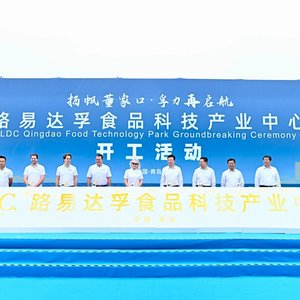Swimming around and around in a 20,000 gallon tank at the University of Rhode Island’s Bay Campus are several large yellowfin tuna captured last fall about 100 miles off the Rhode Island coast. The fish are part of the first effort in the United States to breed tuna in a land-based aquaculture facility to meet the growing demand for one of the ocean’s top predators.
“Worldwide demand for tuna increases yearly, even as tuna stocks are dwindling precipitously,” said Terry Bradley, a URI professor of fisheries and aquaculture. “What we’re trying to do is produce fish in captivity and take the pressure off the wild stocks.”
Bradley and Peter Mottur, director of Rhode Island-based Greenfins, are taking the first steps in developing the techniques to raise tuna from egg to harvest size while creating a new sustainable industry in Rhode Island.
According to Bradley, some in Australia, Mexico and several Mediterranean countries are doing what he calls “tuna ranching” by capturing wild tuna, putting them in pens and raising them to harvest size. “All they’re doing is taking wild fish and fattening them up,” he said. “It’s still depleting the wild population and has had a long-term impact on tuna stocks.”
Bradley and Mottur are starting the process by trying to get a few wild-caught tuna to spawn in the URI tank, but it is a challenging undertaking. Tuna are long-distance migrants that swim at great speeds, so acclimating them to a 20-foot diameter tank has been difficult. Once the fish spawn and the eggs hatch, the microscopic larvae must be fed live food raised on site. Then they must be weaned from live food to a dry, formulated feed.
“The early stages of the project are all about research – learning about the early life cycle of these fish and developing the techniques to raise them,” Bradley said. “But we also think there is a lot of commercial potential.”
Bradley and Mottur envision local entrepreneurs using the techniques they develop to produce juvenile tuna that could then be sold to others who want to grow them further. In Japan, an eight-inch juvenile tuna raised in captivity can be sold for $100 to $125.
“It’s a sustainable project that we hope will create green technology jobs here in Rhode Island to leverage the great intellectual capital we have in the state,” said Mottur. “We’ve already developed a partnership between URI and my company, and we hope to take it from the research phase to the commercialization phase once we demonstrate tuna breeding and larval rearing success.”
Mottur has started several technology companies in Rhode Island, but his passion is the ocean and he enjoys offshore sport fishing and freediving, which led him to learn about the issues facing tuna.
“I got involved in the project when I learned that no other organization in the U.S. was keyed in to tuna aquaculture,” said Mottur, a graduate of URI’s fisheries and aquaculture program. “I see an enormous opportunity with yellowfin tuna and eventually with bluefin tuna, which has been under significant global fishing pressure over the past 20 years.”
Bradley and Mottur believe that construction of a larger tank, which will be built at the URI Bay Campus later this year, will markedly increase the project’s likelihood of success.
“Tuna are open ocean fish that require a lot of space and need very good water quality,” Bradley said. “If you put too many fish in a tank, they get stressed and the water quality begins to degrade. The less you stress them, the more likely they are to spawn in a reasonable time frame.”
According to Bradley and Mottur, it’s the ideal time for a tuna aquaculture venture.
“Japan can’t produce all the tuna it needs for the country’s own purposes, and the U.S. is a net importer of fish, including tuna,”
"The Rhode Island Economic Development Corporation is excited to link a Rhode Island entrepreneur and the state's flagship university in this unique sustainable tuna aquaculture research project," added John Riendeau, director of business development for the RIEDC.2










